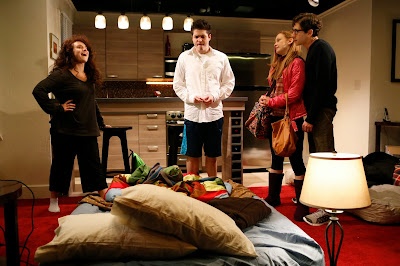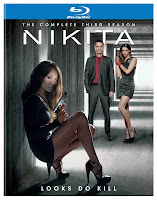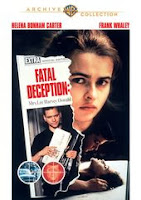- Details
-
Parent Category: Film and the Arts
-
Category: Reviews
-
Published on Monday, 28 October 2013 00:06
-
Written by Kevin Filipski
Embrace of the Vampire
(Anchor Bay)
This isn’t the original 1995 cult “classic” with Alyssa Milano in her nude glory—instead, this loose remake stars equally attractive Sharon Hinnendael as the virginal teen caught up in sexual and violent shenanigans.
It’s as dumb as the original without Milano’s freshness, even if Hinnendael’s beauty also turns a few heads. What’s most problematic is the amateurish acting by much of the cast, which makes the original movie seem much better in retrospect…relatively speaking, of course. The Blu-ray transfer is solid.
(Vivendi)
In this dragged-out TV movie (an extended version of the original shown last month on Starz), it takes three hours to sort out a plodding sci-fi plot about the imminent destruction of the earth by a solar flare caused by a spaceship with the First Lady aboard.
As we watch a do-gooder in Afghanistan (Julia Ormond seems bemused by her thankless role), the president and his young daughter, and the renegade scientist who might be the planet’s only hope, all I can say is….zzzzzzzz. The hi-def images look fine.
I Married a Witch
(Criterion)
Although this 1942 fantasy demonstrates director Rene Clair’s droll comedic touch, it’s a resplendent Veronica Lake—a movie star who looks ravishing—who makes this humorous but slight comedy about a reincarnated Salem witch a true classic. Frederic March is perfect as Lake’s straight man, but it’s her show all the way.
The Criterion Collection’s Blu-ray includes a stellar hi-def transfer, while the extras are seriously skimpy for a Criterion release: there’s a Clair audio interview, and that’s it.
(Vinegar Syndrome)
In this disposable 1986 flick, segments from three unfinished films are cobbled together, which feature dismemberment, Russian roulette and other horrors, as God and Satan sit on a train discussing the characters’ fates. Although non-finicky gore fans might say otherwise, for most viewers, this will be a colossal waste of 90 minutes of precious time.
The Blu-ray looks OK despite the quality of the transfer; extras comprise a commentary, interviews with director/producer Jay Schlossberg-Cohen and editor Wayne Schmidt and a bonus film, Gretta, on the DVD.
Nikita—Complete 3rd Season
(Warners)
In a tense showdown, trained assassin Nikita Mears confronts the Division’s renegade Amanda after she blackmails her into attempting to assassinate the president of the U.S.
As always, the series’ plots are far-fetched, but when it’s been made with such slickness—and does anyone fill out a tight body suit while performing her own stunts like Maggie Q as Nikita?—then we have another successful 22-episode season. The Blu-ray looks terrific; extras include deleted scenes and gag reel.
(Doppleganger)
This bloody Australian comedy is shockingly empty at its core: although director-writers Colin and Cameron Cairnes think the over-the-top violence and sex is hilarious, the sad truth is, it’s not.
And that’s too bad, because at the center of this mess is an impressive and natural performance by Aussie actress Anna McGahan, who happily isn’t in the Naomi Watts-Nicole Kidman mold; instead, she’s more like Abbie Cornish, a chameleon who’s also a devastatingly understated and accomplished actress. The hi-def transfer is quite good; extras include featurettes.
(Anchor Bay)
After his overwrought Drive, director Nicolas Winding Refn returns with an insipid drama starring a nearly mute Ryan Gosling that makes the earlier film a model of restraint. In 90 minutes of unrelievedly violent scenes, Refn rips off everyone: Kubrick, Michael Mann, Malick, John Woo and Scorsese.
Even Cliff Martinez’s eclectic score, taken from Penderecki and Tangerine Dream, evokes Mann and Kubrick movies. The only reason to watch is Kristin Scott Thomas’s hammy turn as Gosling’s profane mom—but even her one-note acting palls quickly. The Blu-ray looks gorgeous; extras are Refn commentary and interview, making-of featurette and Martinez interview.
(Syfy)
From the creators of Primeval comes another series in which extinct creatures, mainly dinosaurs, travel through time and appear in Canada, where they are able to tear apart unsuspecting, defenseless humans.
The special effects are quite good, but a dull cast and uninspired plots make this hit-or-miss, even for sci-fi fanatics. The hi-def transfer looks great, even if this is no Jurassic Park; extras include interviews and 13 making-of featurettes—one for each episode.
Call Me Kuchu
(Cinedigm)
This documentary could make a difference in a 24/7 world in which important issues fall through the cracks, showing how Uganda’s anti-gay crusade reached its zenith with a bill that made being gay a crime punishable by death.
Directors Katharine Fairfax Wright and Malika Zouhali-Worrall evenhandedly allow both sides to talk, but their overwhelming sympathy is with those on the right side of history; the senseless killing of gay rights advocate David Kato, which solidified international outrage against Ugandan homophobia, may have helped turn the tide. Extras are deleted scenes.
Club Med and Fatal Deception
(Warner Archive)
Club Med, Bob Giraldi’s 1986 dud, finds little chemistry between Linda Hamilton and Jack Scalia as its romantic leads, but Hamilton’s frizzy hairdo is worth a chuckle, and an embarrassingly unfunny bit role for then-standup comic Bill Maher—yes, that Bill Maher some.
1993’s Fatal Deception, a TV movie starring Helena Bonham Carter as Lee Harvey Oswald’s Russian wife Marina, is worth seeing for her excellent performance and a chilling Frank Whaley as the assassin.
(available through WarnerArchive.com)
(Sundance Selects)
In his valuable reporting for The Nation magazine, Jeremy Scahill uncovers the covert operations of America’s military and intelligence forces—and this film, from his book of the same name, is 85 minutes of eyewitness accounts of the innocent victims of our ongoing “dirty war.”
As pertinent as this is, there are problems: Scahill, narrator and onscreen surveyor, is a blank, and the movie is simplistic and rather manipulative. Perhaps the book puts it all in context. The lone extra is a making-of featurette.
Virgin and the Lover and Lustful Feelings
(Vinegar Syndrome)
1970s B-movie resurrections continue with a pair of actual hard-core porn flicks: but in these days of easy-to-get internet porn, does anyone feel nostalgic for indifferently acted attempts to tell actual stories loaded with sexual activity?
Virgin and the Lover is a deadly mix of soft- and hardcore footage, but Lustful Feelings at least has Leslie Bovee, one of the sexiest of the vintage porn actresses. Bovee fans out there should pick this up immediately.
(Acorn)
This decidedly unglamorous police procedural features Gillian Anderson’s forceful portrayal of a British detective in Belfast tracking down a killer—and there’s also a persuasive performance by Jamie Dorman as the psychopath, as well as John Lynch and Archie Panjabi as colleagues.
The atmosphere conjured by director Jakob Verbruggen and writer Allan Cubitt helps make this five-episode mini-series the television equivalent of a page-turning novel. Extras include a behind the scenes featurette.
(First Run)
A century of the environmental movement, which began with John Muir against moneyed interests trying to make the Grand Canyon a playground for the rich and powerful, is surveyed in this educational overview, from Rachel Carson’s Silent Spring and Love Canal to Greenpeace and the Kyoto Protocol.
Split into five sections, and narrated by Robert Redford, Ashley Judd, Van Jones, Isabel Allende and Meryl Streep, Mark Kitchell’s documentary is a call to action in this dangerous era of climate change denial.
Hart of Dixie—Complete 2nd Season

(Warners)
This series would probably be more accurately called “Pretty People”: Zoe (the always adorable Rachel Bilson), the Northeast doctor now acclimated to the small southern town to which she moved to open a practice, goes back and forth between George and Wade (played by the equally handsome Wilson Bethel and Scott Porter).
This 22-episode soap opera isn’t much as a drama or comedy, but it’s eye candy of the first order—and did I mention that Jaime King is also around?
Last of the Summer Wine—Vintage 2000
(BBC Home Entertainment)
This long-running BBC sitcom about a group of longtime friends was filming its 27th season in 1999 when one of its stars, Bill Owen, sadly died: episodes had to be rewritten and reshot in order to continue as many storylines as possible.
It’s too bad that the series is basically foolish nonsense despite the solid comic actors involved, like Peter Sallis, Frank Thonton, Owen and his son Tom. Long-time creator Roy Clarke strains to find much invention or humor, but it seems that such humor doesn’t translate well crossing the pond. Or maybe it’s me.




























